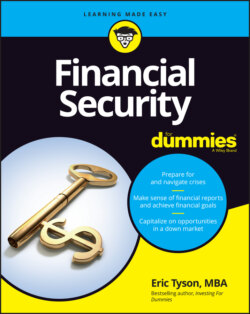Читать книгу Financial Security For Dummies - Eric Tyson - Страница 49
Considering a comprehensive checklist
ОглавлениеI close this chapter with a checklist of important items to keep in mind as you’re navigating a personal crisis that is impacting your finances. We’ve covered all of these in one way or another in this chapter, but I provide you with this final, overall list so you can use it to remind yourself of key things to do and consider when you’ve encountered tough times.
Be prepared for tough times. This preparation can include having an emergency reserve and flexible spending so that you can more easily reduce your spending. Try to minimize the amount of spending that you engage in that is locked in, for example, through contracts for an extended period of time.
When trouble hits, set aside time to consider and discuss the situation with family or someone you can trust. Spend time brainstorming on your topics of concern, including ways to reduce your spending.
Make note of benefits you lose through an employer and develop a plan to replace needed catastrophic insurance. You always need health insurance, and until you’re financially independent, disability insurance. If others are dependent upon your employment income, you should also have term life insurance.
Be flexible and keep an open mind. A crisis can lead to opportunities for change and may include things like moving or simply changing your approach to certain aspects of your life and finances.
Be prepared to negotiate and advocate for yourself and situation. This can include things like your housing and being able to meet the terms of your mortgage repayment or rental payments for a lease or dealing with an insurance company claim. If you have a hard time doing these things, enlist the support of someone who is comfortable and adept at doing this.
Take time for your mental health and decision making. You should always do this, but it’s especially important for you to take a little time every day to do things that you enjoy and that help you to relax. For some folks, this can be exercising, reading a good book, listening to music, and so forth.
Understand and make use of your employee benefits. In my work as a financial counselor, I often discovered valuable employee benefits that my clients had overlooked or forgotten they had access to.
Understand the tax consequences. Many financial decisions involve tax considerations, so be sure you understand those issues and tax reduction opportunities associated with those decisions.
Find out about safety nets. When you’re facing a personal financial crisis, you may qualify for some of the numerous safety net programs at the federal, state, and local levels. Please see Chapter 4 for the details.
Make informed decisions after doing research. When you’re stressed and perhaps pressed for time with everything that’s coming at you, you’re more likely to make an emotionally based decision. Don’t add to your difficulties by making bad decisions. Do the necessary research and consult experts or smart people who can help you to make an informed decision.
